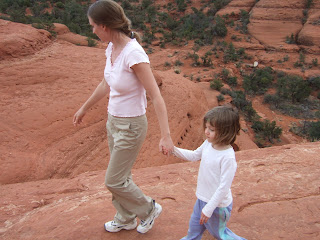Your Daily Miracle: Falling Into the Grass
When she was a child, my friend Julie recounts, she used to climb to the top of a tree and stay in that secret space for hours. For her, it was more than a game. It was a ritual of mystery and wonder.
“I don’t know exactly what praying is,” Mary Oliver writes in her poem The Summer Day, “I do know how to pay attention,” she continues, “how to fall down into the grass.”
As much as I love Mary Oliver’s simple words, I grew up thinking of prayer as less of a 'climbing-a-tree' activity but as something much more formal, a set of words stacked carefully into the structure of a certain time and place: at church, in bed before sleeping, at the table before a meal. "Prayer" was accompanied by a cessation of activity--usually more fun activity--and worried me with its expectations. Would I choose the right words? Would I sound 'holy' enough or put my thanks, desires, and adulation into proper order? Despite my anxiety, I continued obediently fitting Prayer, with a capital P, into my life--and felt guilty when I didn't.
Likewise, Julie’s early Catholicism provided a ready stock of prayers and the expectation for their practice. As the years went by, she added yoga and meditation to her ideal meditation. But now as a single mom of three teenagers, there’s little time for anything but survival. Julie tells me she used to feel burdened about the lack of ‘sacred spaces’ in her life.
Then something a friend said reminded Julie of that treetop of her childhood, and she realized she’d been praying every day without knowing it. “I feel bowled over by ordinary things, like the face of a child I’m teaching or the beautiful swirls of oil in a parking lot puddle,” she says. “Are those moments of wonder and gratitude not prayers?”

The answer, Brother Lawrence would tell me, is to Practice Presence. Different religious traditions assign different words to this discipline. While Brother Lawrence described a direct, minute-by-minute awareness of the presence of God, other traditions emphasize the discipline of being fully present to the moment and aware of one's own temporal place there. That makes us both grateful and humble. My friend Julie put her finger on it, I think, when she described the mindful moments in her life. I see the same attentiveness to the present moment in the haiku of Kobayashi Issa (whom I imagine sat with bullfrogs quite a lot), or in the luminous descriptions of Annie Dillard.
My own ideas of prayer have expanded, too. When my friend was ill with breast cancer, I used to make her soup; as I chopped vegetables and dropped them into the pot, I began to realize I was praying. Onions, garlic, and carrots took the place of words.
Whether or not you recognize a Divine Other as recipient of and perhaps respondent to your prayers like Brother Lawrence did, I believe the habitual practice of “falling into the grass,” of giving thanks, completely transforms us. Some days my prayers are halting and my attention dried by worry or irritation. But I long for prayer to soak my life with gratitude.My own ideas of prayer have expanded, too. When my friend was ill with breast cancer, I used to make her soup; as I chopped vegetables and dropped them into the pot, I began to realize I was praying. Onions, garlic, and carrots took the place of words.
The practice of intersecting with the material of this world in an attentive way leads me out of navel-gazing and anxiety and into recognition and thankfulness. I believe that we must feed ourselves richly in order to see and listen better, to sustain and focus our attention on what is worthwhile. But what is worthwhile is most often the common, apparently mundane material of our lives, as Oliver says in her poem Praying: “It doesn’t have to be/the blue iris, it could be/weeds in a vacant lot, or a few/small stones.” Just pay attention! the poem advises--in a world of wonder, prayer requires only a few words--or no words at all.




Comments
The other thing about Brother Lawrence is that he writes that he came to the place of practicing the presence through over ten years of trying, of failing and trying again, of "pain" and "much suffering". He wrote his letters after thirty years of devoting himself to practicing God's presence. He talks about the need to have great purity in life and to mortify the senses and not take delight in earthly things. So there's living in the tension again. According to Lawrence, prayer is simple and beautiful, but also involves real work, pain, practice and sacrifice. But never guilt. And it's often hard to work at something without feeling guilt when we fall short.
I know that his idea of Practicing Presence is different at its source than other religious ideas of the present moment, but I think there's a similarity as well. In both we seek to be content and thankful; in both we seek simplicity and the daily practices of life and we are present to them. I do know the conversation is fundamentally different but I believe there is some synthesis in the actual practice of both.
Amazing--I just heard this discussion (including Brother Lawrence) taken up in an interview between Krista Tippett and Marie Howe. You would really enjoy it: https://onbeing.org/programs/marie-howe-the-poetry-of-ordinary-time/